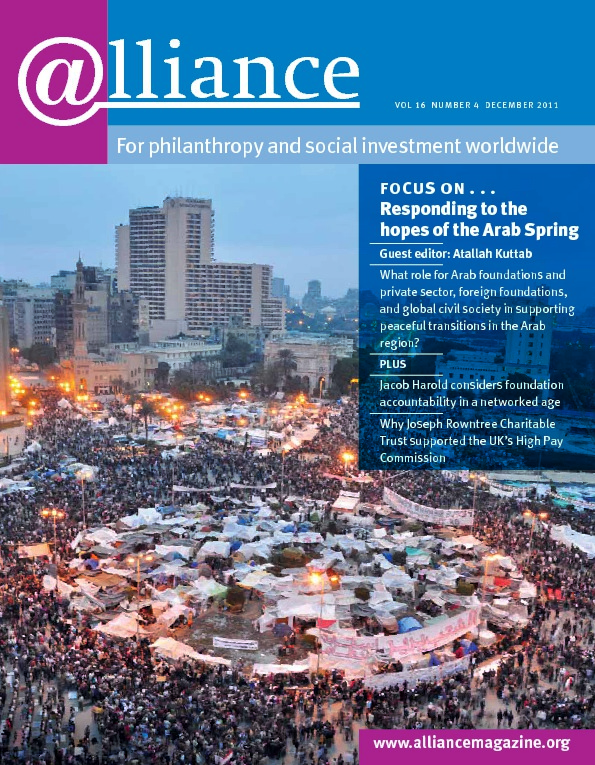The emergence of the Bill and Melinda Gates Foundation as a major force in global public health and US public education should be welcomed by those who believe in the promise of philanthropy to address social issues. As many of the commentators in the last edition of Alliance point out, Gates is changing the landscape in its fields of operation – and the terms of philanthropy itself.
Rather than risk under-utilizing its substantial assets by simply giving away money, it recognizes its responsibility to use independent resources for the public good and is rising to the challenges of effective philanthropy. It is also encouraging others to do the same, most notably through the Giving Pledge pioneered by Bill Gates and Warren Buffett, which currently lists 69 signatories pledged to spend the majority of their wealth on philanthropic causes. These changes to the current understanding of philanthropy raise renewed questions about what foundations are, what they do, and who they are accountable to.
The accountability of foundations needs to be understood in the specific legal and regulatory environment in which they are registered and which shape accountability requirements. In the UK, this means operating within the framework of the Charity Commission and its test of public benefit, which is imposed on all charities including foundations.
Perhaps a more pressing issue is the power of foundations to influence priorities in their specific fields of operation. However, this can also apply to many other organizations including governments and business, lobbyists and international bodies like the UN as well as the wider charitable sector. The presence of foundations in this mix should be seen as a potentially positive development bringing fresh resources, thinking and expertise to tackle difficult issues.
Foundations therefore need to ensure they have the expertise to make good decisions. If a foundation lacks expertise, they can employ more experts. The growth in the number of employees at Gates to almost 1,000 probably reflects a desire to ensure prudent stewardship, good spending decisions and effective use of resources commensurate with the size and scale of the problems being addressed.
These questions of accountability and influence necessitate greater scrutiny of foundations but also increased public understanding of their work. Foundations should be ready and willing to explain their decisions, answer questions about their strategic choices, engage with the media, and be held to account by the public from whom they receive tax benefits. This already happens with many major charities such as Oxfam and Marie Curie Cancer Care, which enjoy high levels of public trust – so why not foundations?
All of this underscores the need to ask legitimate questions of foundations. Here are some that I would start with. How should foundations’ investment choices relate to their mission? Can a desire to demonstrate ‘impact’ lead to an approach too focused on technological interventions and quick wins based on narrow metrics rather than strategies that address the wider social, economic and political context?
Also, in the case of international development, what should foundations say and do about human rights issues, especially when working in non-democratic countries? For example, should a foundation trying to improve public health in, say, Zimbabwe raise concerns about extra-judicial killings and restrictions on media freedom and civil society as well as other abuses? Would this undermine its focus on helping the most vulnerable children through vaccination and other means?
Depicting the Gates Foundation as a gorilla was perhaps not the most subtle way for Alliance to raise the debate about the role of philanthropy in society. But the kind of scrutiny the issue is receiving is precisely what philanthropy needs to help raise its game, and realize its full potential as a major force for good in the world. There is probably no one better placed than Bill Gates to personify this change. In that sense, perhaps, we are all Gates now.
Charles Keidan
Director, Pears Foundation, UK





Comments (0)